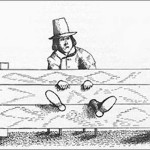If laughter makes the world go round, writers who mangle their homophones help keep our planet spinning. Now and then we all write something different from what we intended, but a news article in last week’s paper made me laugh out loud. The feature, about an upcoming wild mustang (as in horses) sale, explained how mustangs and burrows needed to be controlled to avoid overgrazing. Burrows! I don’t know about you, but I’ve seen relatively few burrows doing much of anything except being, well, places for critturs to hide underground. Of course the correct word was burros, as in a small donkey, and I’m sure the writer knew the difference. The point is that the computer spell checker didn’t know a burrow from a burro, and the writer must have wished she had a burrow to hide in.
Writing Tip for Today: Homophones are words that sound alike but are spelled differently and have different meanings. When you edit your work, beware of homophones–they sneak in, with no squiggly red or green underlines to alert the unsuspecting wordsmith. Don’t waist you’re thyme–all ways Czech you’re spelling. Groan.
Ready to take your writing to the next level? e-mail me




